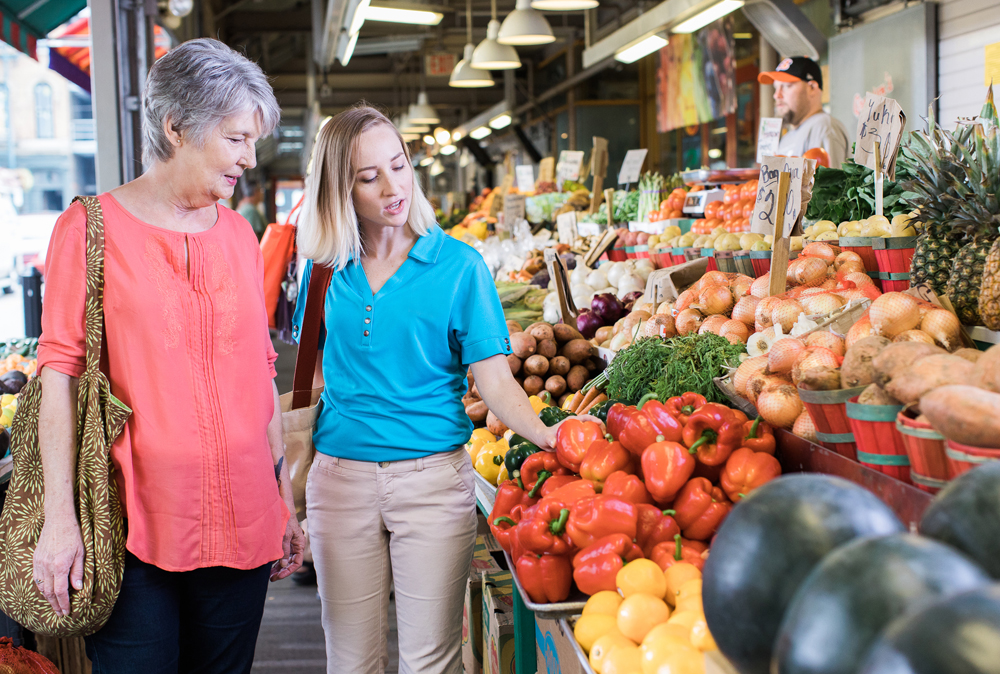Elderly Malnutrition; Spot the Signs of Malnutrition in your Elderly Relative
As we age, our bodies need fewer calories yet require more protein, calcium, B vitamins, and other nutrients to stay healthy. While malnutrition is generally caused by a lack of these nutrients from food, its real causes are often complex and stem from several physical, social and psychological issues. Unfortunately, there remains a general lack of awareness about the specific dietary needs of older people and how nutrition plays a key role in their well-being and longevity.
Older people are particularly susceptible to malnutrition because they not only have different nutritional needs than younger adults, but they also take more medications and have higher rates of chronic medical conditions such as diabetes and heart disease. They also may be experiencing a change in their taste buds, a lack of appetite, or depression – or may just have trouble getting used to new nutritional needs after decades of employing certain eating habits.
Common Causes of Malnutrition in Older People
Malnutrition does not solely happen to older people with a loss of appetite or lack of healthy food. The causes of malnutrition as we age are wide and varied.
The following are some common reasons for malnutrition in older people:
- Lack of interest in cooking
- Living alone and eating for one
- Changing taste buds
- Medication side-effects that suppress appetite or create bitter tastes
- Restricted diets such as low-sodium or low-fat diets
- Depression
- Trouble swallowing
- Trouble eating, due to sore gums
- or poor dental health
- Limited income to buy nutritious food
- Paying for expensive medications
- instead of food
- Lack of mobility to get to the store
- Dementia
9 Ways You Can Help a Senior Get the Proper Nutrition
Remember, identifying and treating nutrition issues early can promote good health, greater independence and increased longevity. Take steps now to ensure your loved one’s nutrition.
- Talk to their doctors. If an older adult is losing weight, work with his or her doctors to identify and address contributing factors. Changing medications that affect appetite, curbing or eliminating any diet restrictions until the nutritional problem passes and working with a dentist to treat oral problems can help. Ask for screenings for nutrition problems during routine office visits and inquire about nutritional supplements. You might also request a referral to a registered dietitian.
- Encourage him or her to eat nutritious foods. Spread peanut butter or other healthy spreads on toast and crackers, fresh fruits, and raw vegetables. Sprinkle finely chopped nuts or wheat germ on yoghurt, fruit, and cereal. Add extra egg whites to scrambled eggs and omelettes and encourage the use of whole milk. Add cheese to sandwiches, vegetables, soups, rice, and noodles.
- Liven up bland foods. Add lemon juice, herbs, and spices to foods. If the senior is experiencing a loss of taste and smell, try some new seasonings and recipes.
- Encourage healthy snacks. A piece of fruit or cheese, peanut butter by itself or as a spread or a fruit smoothie can provide healthy nutrients and extra calories.
- Make meals into social events. Visit at mealtimes or invite older relatives for dinner at your home or out at a restaurant. Encourage them to join programs and senior centres where they can dine with others.
- Make sure they get regular physical activity. Even light daily exercise can stimulate appetite while strengthening bones and muscles.
- Provide tips for saving money. Persuade older relatives to have a shopping list at the store, check store flyers for sales and select less expensive brands. Suggest splitting the cost of bulk goods or meals with friends or family members and dining at restaurants with senior discounts.
- Boost hydration for overall good health. Older people should get at least 64 ounces of healthy fluids per day.
- Consider outside help. If necessary, hire a caregiver to shop for groceries or prepare meals. Consider Meals on Wheels and other community services. Your local Area Agency on Ageing or a county social worker also might be helpful.
The Signs of Inadequate Nutrition
Nutrient deficiencies and malnutrition can lead to a variety of health concerns. While malnutrition is harmful at any age, it can be especially dangerous for older adults.
These are some signs of malnutrition in older people:
- Excessive or prolonged sadness
- Lack of energy
- Memory issues or oncoming dementia
- Getting sick often
- Bruised or dry, cracked skin
- Wounds that are slow to heal
- Out-of-date food in the fridge
- Trouble chewing or swallowing
- Loss of appetite
- Weight loss
- Loose-fitting clothes
- Muscle weakness
Expert Home Care, For All of Life
If you feel that your ageing relatives could use extra support with their nutritional, physical or emotional needs, our expert home care service can help.
For over 80 years, Prestige Nursing & Care has helped people live safely and independently in their own homes, for all of life. Our dedicated carers can support your loved ones through the entire shopping, meal planning and cooking process to ensure they are enjoying nutritionally-balanced and satisfying meals.
On top of promoting a healthy, well-balanced diet, our carers are trained to look for the signs of malnutrition in older people. They will keep a close eye on your loved ones while proactively watching for the signs of malnutrition.
Find out why our clients choose Prestige Nursing & Care for a high-quality, responsive home care service.

